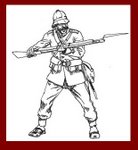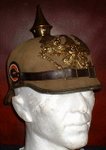 SCIENCE FICTION ADVENTURES IN A MORE CIVILISED TIME
SCIENCE FICTION ADVENTURES IN A MORE CIVILISED TIMEThe original Space: 1889 game was one of many roleplaying games
that were published in the wake of the huge success of Dungeons and
Dragons. Space: 1889 was devised and written by Frank Chadwick.
The two-hundred page core rulebook was first published by GDW in
1988 and provided everything that was needed to create and run
adventures for two or more players in a Victorian science fiction setting.































5 comments:
Don, and viewers. The combat system in Space: 1889 is somewhat 'awkward'.
Paul Westermeyer reworked it thusly:
I've never been especially happy with combat in Space:1889, the weapons seemed underpowered (NPCs were limited to 2 wounds to make this 'fair' but NPCs should always be treated same as PCs, in my book:)), the difficulties off, ect. Plus, it used a different system to resolve actions then the skill resolution system.
Anyway, Lee Hanna and I hammered out a new system. Any flaws are mine, of course:)
Here it is, please comment:)
Ranged Combat
Everyone gets four actions for each 30 second round in ranged combat.
Ranged Combat attacks are made using Marksmanship, Throwing, or Gunnery as appropriate.
Marksmanship: The attacker rolls dice equal to his marksmanship skill against difficulty as shown below:
Marksmanship Dif.
Within range 8
Double range 12
Triple range 16
Quadruple range 20
Marksmanship Modifiers (applied to difficulty number)
Target Charging -1 Target Airborne +1 Target Mounted +1 Target Lt. Cover +1
Target Md. Cover +2 Target Hv. Cover +3 Fire Multiple shots +1
Lack Req Str +diff Firer Walking +1 Firer Running +2 Target Walking* +1
Target Running* +2
* Does not apply if Target also dodging
Dodging:
GM determines Difficulty per Task rules, players rolls Agility. A
successful dodge adds +1 for every number above the needed roll to the
attackers difficulty. If the dodge is failed no attacks can be made that action.
Example: Verne dodges Lizardman arrows in a jungle. GM rules difficulty is only Easy [4]. Verne rolls his 3 Agility dice and gets a 10. 10-4=6 so, Verne gets to add +6 to the Lizardmen's marksmanship difficulty.
Gunnery & Throwing:
Gunnery applies to machine guns and artillery. All the standard rules on pages 98-99 apply except as modified here for saves and damage. Machine guns do use the difficulty modifiers listed above under Marksmanship.
Throwing is used as Marksmanship above when used for thrown weapons such as knives or spears, when used to throw explosives or other area effect munitions use the rules on page 3 of the Referee's screen.
--------------------------------------------
Close Combat:
All combat where the protagonists are within ten yards of each other is Close Combat. The number of actions in a turn are equal to the Agility or Close Combat score, whichever is higher. Close Combat attacks use the Close Combat or Fisticuffs skills as appropriate. The base difficulty of all Close Combat attacks is 4. Missile weapons use the Close Combat skill instead of Marksmanship, Gunnery or Throwing but the modifiers above to the to hit roll still apply. Only one shot per action is allowed in Close Combat.
Melee Combat:
The attacker rolls dice equal to his Close Combat (if armed) or Fisticuffs(if unarmed) skills. The base difficulty is 4. if armed, the Hit Dice of the weapon is added to the Close Combat dice. Targets may dodge or block, but not both.
Melee Difficulty Modifiers
Target Charging -1
Target Airborne +1
Target Mounted +1
Less Reach +diff
Lack Req Str +diff
Atker Walking +1
Atker Running +2
Target Blocks +roll
Target Dodges +roll
Blocking:
To block roll either Close Combat (if armed) or Fisticuffs (if unarmed). Add the weapon hit dice if armed (include blocking modifier for weapon).
The roll then is added to the opponent's difficulty number.
Shields add 2 dice if used w/ weapon. Six dice if used to block alone.
Dodging:
GM determines Difficulty per Task rules, players rolls Agility. A
successful dodge adds +1 for every number above the needed roll to the
attackers difficulty. If the dodge is failed no attacks can be made that action.
Missile Combat:
The attacker rolls his Close Combat Skill [Not Marksmanship]. The base hit number is 4. The hit number is modified using the range combat modifier chart.
-------------------------------------
Wounds:
A hit does wounds equal to the wound value listed on the charts, +1 for
every 4 (rounded down) above the needed to hit number. Example: Jack McCoy, Pistol 6, fire on a Martian with his heavy revolver at 15 yards range. The hit number is 8, McCoy rolls an 18. This is 10 more then needed, so McCoy does 3 wounds to the Martian. 1 for the basic pistol damage, and 2 for the skilled shot.
Saves:
For each wound a save is made to see if it takes effect. The save number is listed on the equipment sheet except for melee weapons and fisticuffs.
Armed melee saves are base 1, unarmed is the defenders End + Str - the attackers Str. Save numbers are modified by the chart below. Each successful save removes a wound. Example: The Martian shot in the example above took 3 wounds. The save # is 2, and he has no modifiers. He rolls 3 dice, one for each wound, hoping to roll below a 2 on each. He rolls a '1', '3', and a '5'. One of the saves (the '1') was successful so he actually only takes 2 wounds. Regardless of any saves anyone wounded in a turn may only dodge or block for the remainder of that turn.
Save Modifiers
Close Combat -1 Armor* +AV
*Armor does not count against Modern rifles.
AV is the armor's listed Armor value.
My Perth wargames group has used this very successfully and would recommend them. There is a GURPS conversion too, but I cannot find it at present.
I've always found Space 1889 to
be a bit tweaky. We were at the
time playing Traveller 2300 so
we used a home brew variation of those but, we kept the Space 1889 background.
Your rules are a vast improvement over the original Space 1889 rules! They are also far better than our add hoc attempt!
Mitch great job on the rules rewrite!
Paul Westermeyer and Lee Hanna deserve the praise for the rules. They keep the unique 'feel' of the rules. My group just used them successfully.
Well hope you can pass on our praise...)
Post a Comment